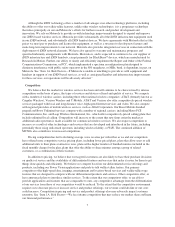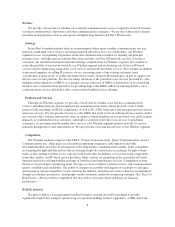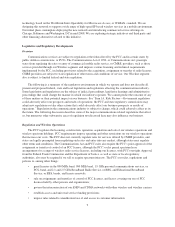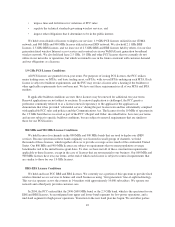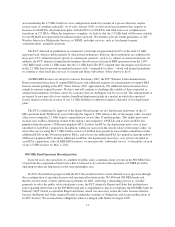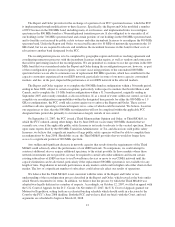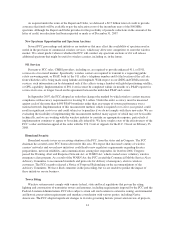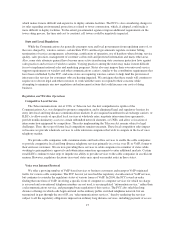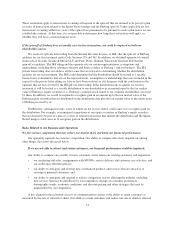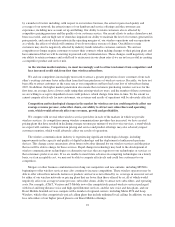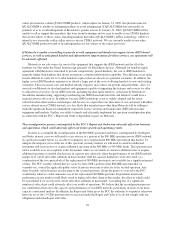Sprint - Nextel 2007 Annual Report Download - page 19
Download and view the complete annual report
Please find page 19 of the 2007 Sprint - Nextel annual report below. You can navigate through the pages in the report by either clicking on the pages listed below, or by using the keyword search tool below to find specific information within the annual report.Access Charge Reform
ILEC and competitive local exchange carriers, or CLECs, impose access charges for the origination and
termination of long distance calls upon wireless and long distance carriers, including our Wireless and Wireline
segments. Also, interconnected local carriers, including our Wireless segment, pay to each other reciprocal
compensation fees for terminating interconnected local calls. In addition, ILECs and CLECs impose special
access charges for their provision of dedicated facilities to other carriers, including both our Wireless and
Wireline segments. These fees and charges are a significant cost for our Wireless and Wireline segments. There
are ongoing proceedings at the FCC related to access charges and special access rates, which could impact our
costs for these services, but these proceedings have been pending for some time and FCC action is not anticipated
in the near future.
In the past year, several ILECs have sought and received forbearance from FCC regulation of certain
enterprise broadband services. Specifically, the FCC granted forbearance to AT&T, ACS Anchorage, Embarq
and Citizens from price regulation of their non-time division multiplexing, or TDM-based high-capacity special
access services. Furthermore, in 2007, the U.S. Court of Appeals for the District of Columbia found that Verizon
was “deemed granted” forbearance from the same rules when the FCC deadlocked on its similar forbearance
petition, and that the “deemed grant” was unreviewable by the Court. Our request for en banc review was denied.
We have appealed the FCC’s rulings with respect to AT&T and Embarq. These deregulatory actions by the FCC
could enable the ILECs to raise their special access prices.
The FCC currently is considering measures to address “traffic pumping” by local exchange carriers, or
LECs, predominantly in rural exchanges, that have very high access charges. Under traffic pumping
arrangements, the LECs partner with other entities to offer “free” or almost free services (such as conference
calling and chat lines) to end users; these services (and payments to the LECs’ partners) are financed through the
assessment of high access charges on the end user’s long distance or wireless carrier. Because of the peculiarities
of the FCC’s access rate rules for small rural carriers, these LECs are allowed to base their rates on low historic
demand levels rather than the vastly higher “pumped” demand levels, which enables the LEC to earn windfall
profits. The FCC is considering the legality of traffic pumping arrangements as well as rule changes to ensure
that rates charged by LECs experiencing substantial increases in demand volumes are just and reasonable. As a
major wireless and wireline carrier, we have been assessed millions of dollars in access charges for “pumped”
traffic. Adoption by the FCC of appropriate measures to limit the windfall profits associated with traffic pumping
will have a direct beneficial impact on us. Also, we and other carriers have traffic pumping cases against several
LECs and their traffic pumping partners pending in various U.S. district courts and the Iowa Utilities Board.
Universal Service Reform
Communications carriers contribute into and receive support from the USF, established by the FCC and
many states. The federal USF program funds services provided in high-cost areas, reduced-rate services to
low-income consumers, and discounted communications and Internet services for schools, libraries and rural
health care facilities. The USF is funded from assessments on communications providers, including our Wireless
and Wireline segments, based on FCC-prescribed contribution factors applicable to our interstate and
international end-user revenues from telecommunications services and interconnected VoIP services. Similarly,
many states have established their own universal service funds into which we contribute. The FCC is considering
changing the interstate revenue-based assessment with an assessment based on telephone numbers or connections
to the public network, which could impact the amount of our assessments, but it is not clear that the FCC is
prepared to take action in the near future. As permitted, we assess customers for these USF charges.
The FCC also is considering changing the way it distributes federal USF support to carriers. In particular,
FCC or state actions could make it more difficult for our Wireless segment, which currently receives support in
24 states as an Eligible Telecommunications Carrier, or ETC, to qualify for and to receive support. In 2007,
through approvals of mergers and acquisitions, the FCC capped the amount of USF money Alltel and AT&T
Wireless can receive, and the FCC is considering other means to cap the amount other wireless carriers,
17


